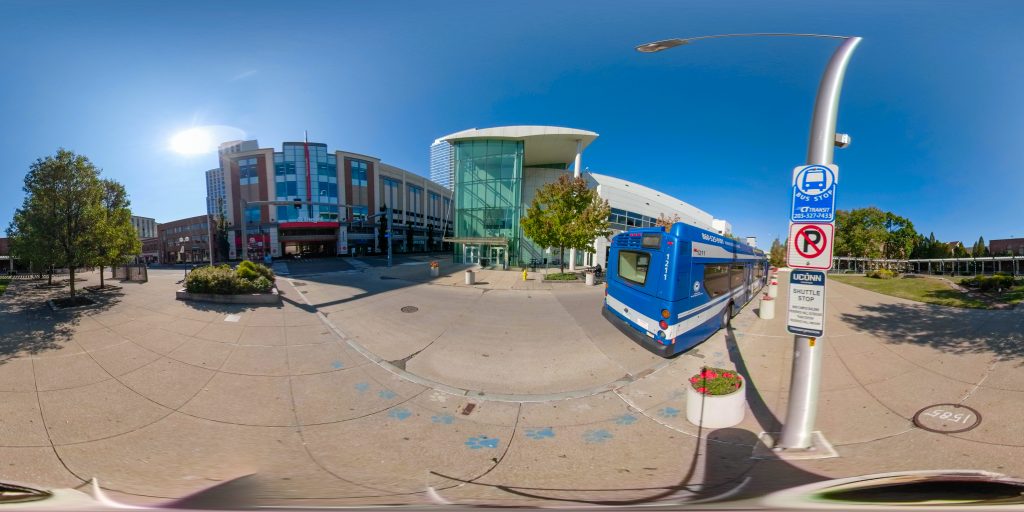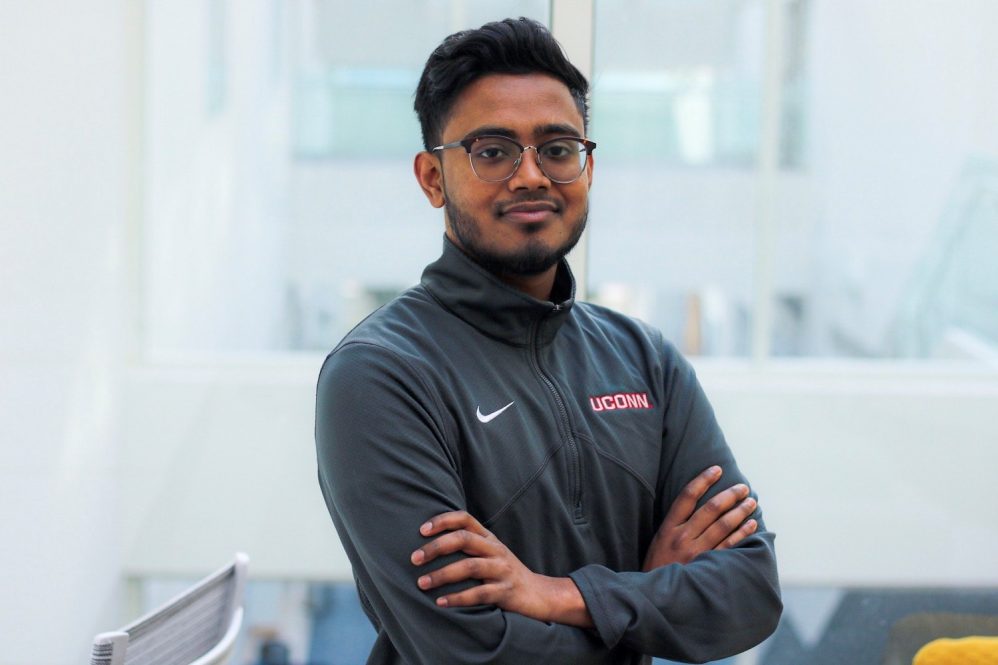Reaj Uddin ‘23 (SFA) remembers studying for a school competition in the seventh grade to try to win $25.
“It was a social studies competition where whoever knows most of the countries in the world gets $25,” he says. “And I studied for like two days in a row, just to know all the countries in the world, just to get that $25 and impress my mom, to make her happy.”
Uddin came close to winning the competition, but ultimately fell just short.
He did not, however, fall short this past October when he brought his idea for a product to help streamline in-home recycling to a pitch night for Get Seeded, a program offered by UConn’s Connecticut Center for Entrepreneurship and Innovation, or CCEI.
He won $1,000 through the pitch night to start developing his company, called EnviGreen Recycling. His original idea was to create a system for sorting, scanning, and crushing recyclables in the home to not only encourage more recycling, but to make the process easier for families like his.
Uddin and his family immigrated to Stamford from Bangladesh in 2009. The youngest of four sons, he was about 10 years old when they arrived in the United States – he had little formal education and spoke no English. He attended remedial schools to learn English before entering public elementary school in Stamford.
In high school, Uddin took a course on web development and found that writing code and building programs appealed to him.
“I didn’t know what to do with my life in high school,” he says. “Then I took this web development course, and it actually made sense to me. I was getting it really quickly and my teachers said, ‘you know, you should try doing this in the future.’ With coding, you can create solutions in almost any field – health, financial services, education technology – and it’s black and white, it’s either coded correctly or incorrectly. You can’t change that, and I actually like that kind of concept.”
I want to be a part of a company that contributes to greater change. I want to be a part of making the world better than what it is right now. — Reaj Uddin '23
Initially, Uddin didn’t plan on attending UConn, or any other college or university, to pursue a career as a developer. He instead looked at trade schools and enrolled in a 24-month training boot camp program.
But he ultimately changed plans at his parents’ urging and dropped out of the boot camp. He applied, and was accepted, into the School of Fine Arts Digital Media and Design Department’s Web/Interactive Media Design program at UConn Stamford.
“My parents insisted – you’re the only child in our family that has one chance to go to college and make something of yourself,” he says. “My other brothers, they finished high school, but didn’t attend any college. My parents wanted me to be the first one, to change the family, in a way. And bringing them here, having them here, I just don’t want them to work as much they did before. I want to provide for them.”
As a sophomore at UConn, he took an advanced web development course where he learned about using APIs – application programming interfaces, a type of protocol for building and integrating app software – and started using them to build his own apps, a process he found he enjoyed.
One of his apps, still a work in progress, uses Spotify API to develop a playlist based on a listener’s emotions – tell the app if you’re feeling happy or angry, and it will build a playlist to compliment your mood.
“I’m trying to improve it by having the camera on, and it will detect your face and, using AI, know what kind of emotions you’re having,” he says, “and with that emotion, create playlists without you having to type it in. You know, sometimes you don’t know what you’re feeling.”
Uddin was part of a small group of students selected for an augmented reality class; the group worked together to create a virtual reality education platform to help student learn about human DNA – it was his first experience building a program in virtual reality.
He is also a member of the inaugural cohort of UConn’s Stamford Startup Studio, a one-year co-op style educational experience offered through the Peter J. Werth Institute for Entrepreneurship and Innovation, where he’s worked with his teammates to build a prototype web application to help make planning weekend activities an easier and better experience for friends and family groups. This semester, he’s been training an AI model as part of the development of the app, called WKNDR.
Uddin and two fellow Startup Studio cohort members are also working to design a computer keyboard that creates electricity while a user types through use of piezoelectric crystals.
“When you press on the keys, the crystals crush and form mechanical energy or electric current,” he says, “which can be stored and then can be used to charge your phone, laptops, anything you want.”

It’s a huge shift for Uddin, who describes himself as an introvert and says he’s never thought of himself as an entrepreneur.
“It’s been such a great experience to watch Reaj grow and really transform throughout the past two semesters,” says Tara Watrous ‘18 (CLAS), the Werth Institute’s Head of Entrepreneurial Transformation and the co-founder and director of the Stamford Startup Studio. “What does life-transformative education look like at Werth? It looks like Reaj! His success story is the reason the Werth Institute works to create authentic life-transformative education experiences. It has been so rewarding to see him flourish.”
Uddin took his recycling startup concept through Traction, a CCEI program designed to help UConn-affiliates build their business model and engage in customer discovery, and he’s currently participating in Accelerate UConn. The concept has pivoted from an in-home product to a solution more broadly aimed at meeting the recycling needs of colleges and universities.
“Coming in, he was not as confident and secure in his abilities, and now he’s going to be interning at a startup in New York City, and he’s working on his own venture,” says Watrous. “He’s pushed himself out of his comfort zone, and I think he’s a great example of what students can achieve when they take the risk and push themselves out their comfort zone.”
For all of his growing success, Uddin hasn’t forgotten his roots – he interviewed for the Stamford Startup Studio while on a visit home to Bangladesh, and he says he hopes to use his entrepreneurial pursuits to contribute to a healthy and sustainable world, particularly for developing countries.
“I want to be a part of a company that contributes to greater change,” he says. “I want to be a part of making the world better than what it is right now.”
He credits the Stamford Startup Studio with helping him develop an entrepreneurial mindset, and for helping him build a network of supportive mentors, advisors, and friends as he sets out on his new ventures.
What does life-transformative education look like at Werth? It looks like Reaj! — Tara Watrous '18, Head of Entrepreneurial Transformation, the Werth Institute
And though he doesn’t always tell his family members about the projects he’s working on – “they wouldn’t understand what I’m talking about,” he explains – he also credits his family, especially his eldest brother, who he says helped him to have a greater vision for his family and inspired him to think beyond what he thought he might be capable of.
“Back in my home, in Bangladesh, we weren’t as fortunate as we are now. We didn’t live in the most lavish home,” Uddin says. “Part of the American dream includes the opportunity for prosperity and success and making a better version of yourself. My brother managed to thrive towards greater social mobility for our family. He built a new house for us back home and truly motivated me to want to make great achievements. When we went back to Bangladesh to see the house for the first time last year, my parents were in tears. We never imagined that we would have a house like this.”
He continued, “It was very inspirational to see him go through all that. I feel he taught me how to connect with people in a good way and make them make them feel valued. I think that’s the most valuable thing that anyone can do – surround yourself with people you love and take care of them.”
To learn more about entrepreneurial education and opportunities offered through the Werth Institute, visit entrepreneurship.uconn.edu.
For more information about venture support opportunities like Get Seeded, Traction, and Accelerate UConn, visit CCEI.uconn.edu.



